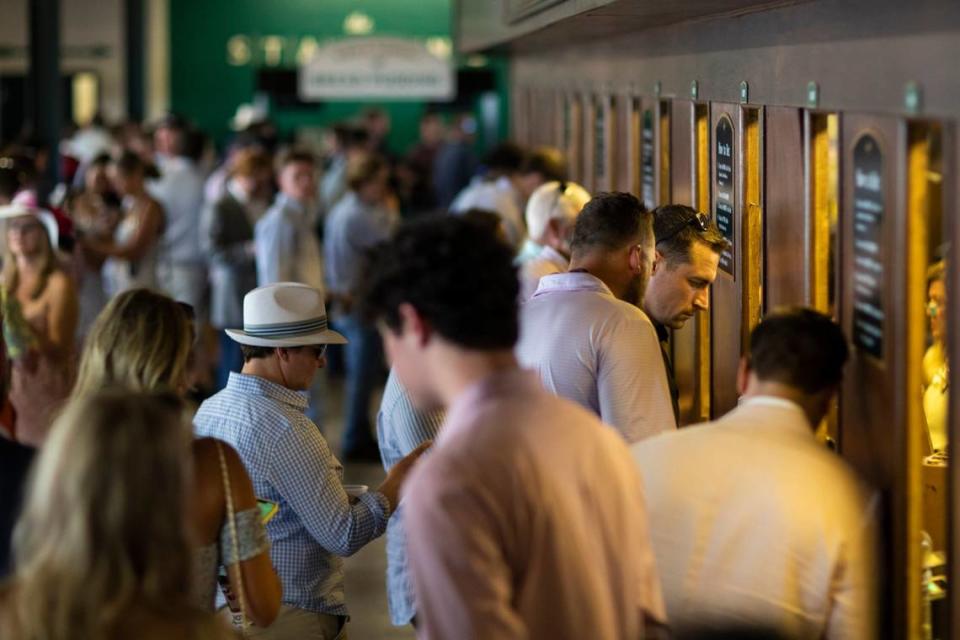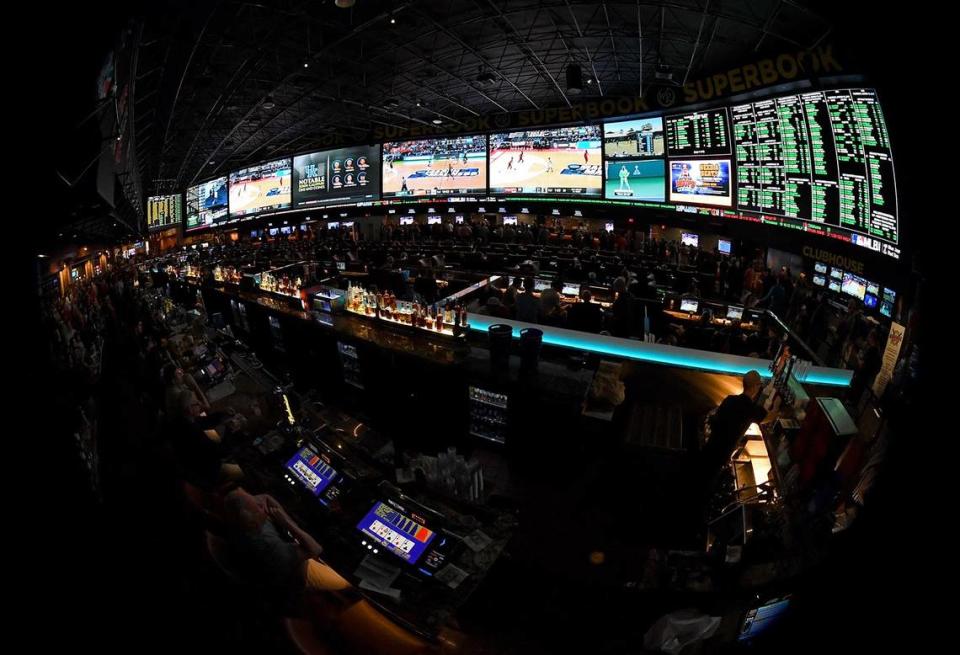Gaming halls with HHR machines are booming in Kentucky. Now comes sports gambling.
It’s a good crowd for a weeknight on a recent Monday evening at Red Mile. I signed up for the Red Mile rewards club, got my player’s card and with a spin of the promotion wheel landed on $100 in free bets. After spending $9 on a hamburger and fries at Frankie’s Bar & Grill, I headed to the gaming machines.
Even though they are historical horse racing (HHR) machines, I found no horses there. Or very few horses, anyway. The games are more like slot machines with one important difference. Instead of the outcomes being determined by a random number generator, winnings are determined by previously run horse races. Instead of betting against the house, I’m betting against other bettors, qualifying the game as a pari-mutuel wagering, which is legal in Kentucky.
And while it is a stretch to say the money made by the tracks from these HHR games has been critical to Thoroughbred racing in Kentucky, the popularity of these gaming machines and venues have acted as a much-needed booster shot for the industry.
“I’m not going to say it saved the racing industry in Kentucky, because we’re going to be strong anyway,” said Jim Goodman, director of wagering development at Keeneland. “It did strengthen it substantially.”
Sometime this fall, another form of betting will be added to the equation when legalized sports betting is launched. By Kentucky law, sports gambling must be done through the state’s nine licensed tracks, who are allowed to partner with up to three sportsbooks each.
What effect that will have on horse racing, as well as the gaming halls, is yet to be determined.
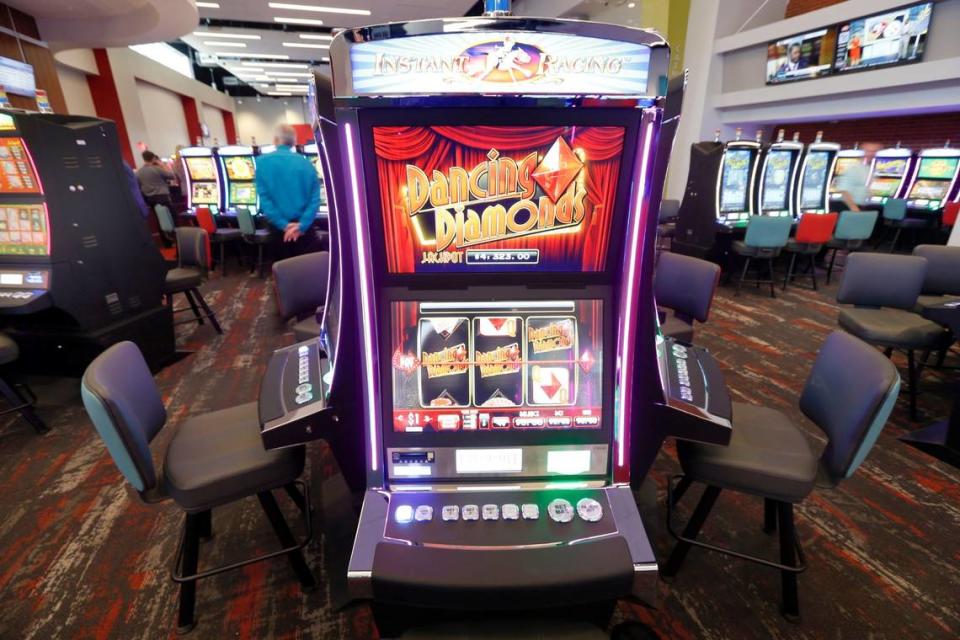
Popularity of HHR machines exploding in Kentucky
Fact is, the popularity of HHR gaming halls is exploding throughout the commonwealth with no end in sight.
For the fiscal year 2019-20, $2.2 billion were bet at gaming halls with $189 million going back to the tracks. By the fiscal year 2021-22, that figure had grown to $6.8 billion, a 47.8% jump from the previous year.
The numbers are only going up. This past February, Kentucky’s historical horse racing handle grew from $574 million in 2022 to $693 million this year. Earlier this month, the Kentucky Horse Racing Commission reported $744.7 million in HHR wagering in May. Much of that has to do with expansion. In 2021, there were 4,734 historical horse racing machines in Kentucky. In 2022, that figure had grown to 5,569 with more on the way.
According to state law, 91% of the wagers go back to the bettors, with the remainder going to the tracks, and Thoroughbred and Standardbred developmental funds. Facility owners pay a 1.5% tax on the total amount bet.
The state received $102.2 million in tax revenues from HHR in 2021-22. Of that $102 million, $43 million went into the Thoroughbred Development Fund, $10 million to the Standardbred Development Fund and $47.1 million to the state’s general fund, as compared to $30.9 million in 2020-21. In the future, numbers are being adjusted so that more revenue will enter the general fund.
“It’s been incredibly important to the Kentucky circuit,” Keeneland’s Goodman said. “What it has done for us, you look at the purse levels for Churchill, Turfway and now Ellis Park and compare them to before historical horse racing started in 2015, I would say Turfway is up at least 50%, Churchill may be up 50%. Our purses at Keeneland are probably up around 20%.”
Bigger purses attract more horsemen and larger fields for bettors. Instead of moving their horses to states where horse racing is supplemented by slots, owners and trainers have been able to stay in Kentucky, thanks to HHR.
“It’s made the Kentucky circuit a lot stronger compared to the other circuits around the country, with the exception of NYRA (New York circuit),” Goodman said. “In Kentucky we’ve kept more horsemen here in the winter instead of shipping to Fair Grounds, to Tampa or Gulfstream. They’re staying at Turfway.”
There have been bumps along the way. Challenged by the Family Trust Foundation of Kentucky in 2014, the Kentucky Supreme Court ruled unanimously 7-0 in 2020 that the machines in three of the state’s five gaming venues (at that time) did not constitute pari-mutuel wagering. That overturned a Franklin Circuit Court judge’s 2018 ruling.
The 2020 decision forced the Kentucky legislature to go back and tweak the system. A new historical horse racing bill was signed into law by Gov. Andy Beshear on Feb. 22, 2021.
“I just think historical racing has advanced so much in the last 10 years,” Goodman said. “And the fact that Churchill has gotten behind it and put in some really nice facilities has helped.”
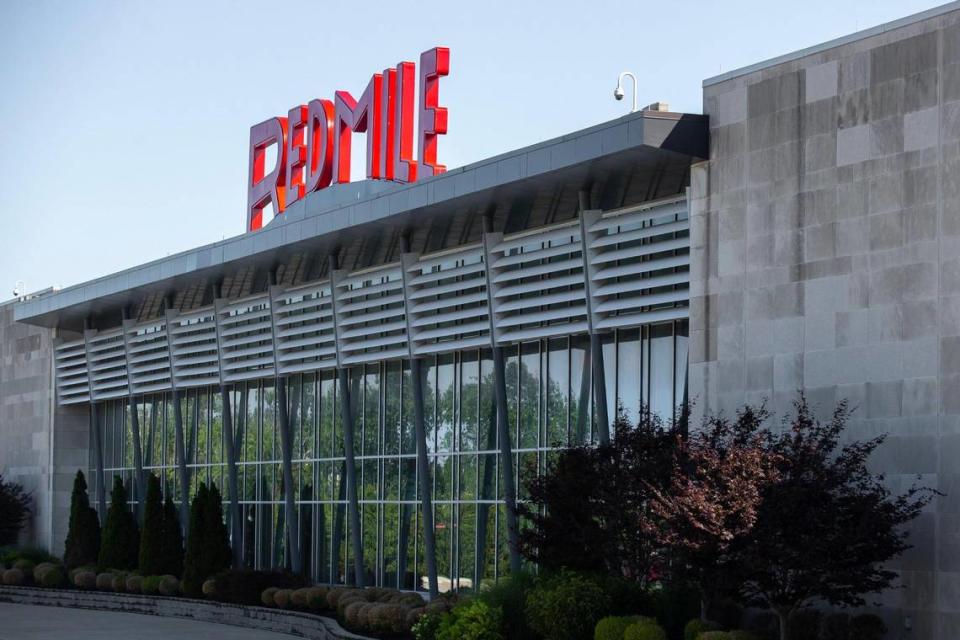
State is seeing continued gaming hall expansion
Derby City Gaming in Louisville, Kentucky Downs in Franklin and Red Mile in Lexington are considered the big three when it comes to the state’s gaming halls, but there are plenty more on the way.
Keeneland partnered with the Red Mile, a privately owned entity, to open a gaming hall at the standardbred track in 2015. It is now home to 900 historical horse racing machines.
“We’ve had a steady gain,” Goodman said. “We started out slow, but we’ve had a steady gain as we’ve put better machines in. We have a great location. We’re up close to 20% over last year.”
The HHR revenue has given harness racing a much-needed boost, as well.
“As you know, Red Mile has been known worldwide for its harness racing and has been for 148 years now,” said Shannon Cobb, chief operating officer at Red Mile. “But locally I think it has taken a backseat to a really popular Thoroughbred community. Given the advent of HHR with much higher purses, the horse population has increased here with full fields. It’s a much more fun and growing environment than we’ve been able to have in the past.”
Kentucky Downs opened its Mint Gaming Hall in 2018. The facility has over 900 HHR terminals. Since then, the Winchell family has opened two additional Mint Gaming Halls. In December 2021, a Mint Gaming Hall was opened next to the Greenwood Mall in Bowling Green. The third opened on Aug. 31, 2022, off off Exit 11 on I-75 in Williamsburg. Both facilities opened with 450 HHR terminals.
The gaming hall at Kentucky Downs has brought players across the border from Tennessee, where pari-mutuel wagering does not exist, much like Indiana casinos brought sports bettors over the border from Kentucky where sports betting was not legal.
In 2018, Churchill Downs opened Derby City Gaming next to the old Louisville Downs harness racing track site. The facility now has over 1,300 machines and features a 123-room hotel.
In 2021, Churchill Downs opened Oak Grove, a harness racing track in Oak Grove, Kentucky, near Fort Campbell and Hopkinsville. The facility is home to a gaming venue with 1,200 HHR machines and a hotel.
Last year, Churchill Downs opened a gaming hall at Florence’s Turfway Park, which the corporation purchased for $46 million in 2019. After tearing down the grandstand and renovating the property, the CDI facility is home to over 800 games and two restaurants.
“The fact that Churchill bought Turfway and put historical horse racing there saved Turfway,” Goodman said. “It was not going in a good direction. The previous owners were not putting the investment in. Churchill came in and built a beautiful facility.”
Last September, Churchill Downs purchased Ellis Park in Henderson, where it now has a gaming facility. Just last week, CDI announced it had secured land outside Owensboro to own and operate a gaming hall extension to Ellis Park. Kentucky law allows satellite facilities within 60 miles of a licensed track.
Later this year, Churchill hopes to open an $80 million gaming facility in downtown Louisville. The 43,000-square foot entertainment center will be located near Fourth Street and include 500 historical horse racing machines as well as a restaurant, three unique bars and a live entertainment stage.
As a joint venture, Keeneland and Kentucky Downs are working on a Cumberland Run harness racing track in Corbin, which is scheduled to open Oct. 15. The group held a harness racing meet at Red Mile back in April. It will be the first harness racing track in Eastern Kentucky since Thunder Ridge near Prestonsburg closed in 2017.
The new Corbin facility will include a gaming hall. The Mint gaming hall in Williamsburg will act as a satellite facility to the Corbin track. Keeneland is a minority partner in the hall.
Revolutionary Racing is planning a $55 million quarter horse racing track and gaming facility near Ashland in Boyd County to be named Sandy Ridge. It also held a meet at Red Mile earlier this year. The gaming facility is to open later this year. Revolutionary Racing said it hopes to have the track opened by 2024 or 2025.
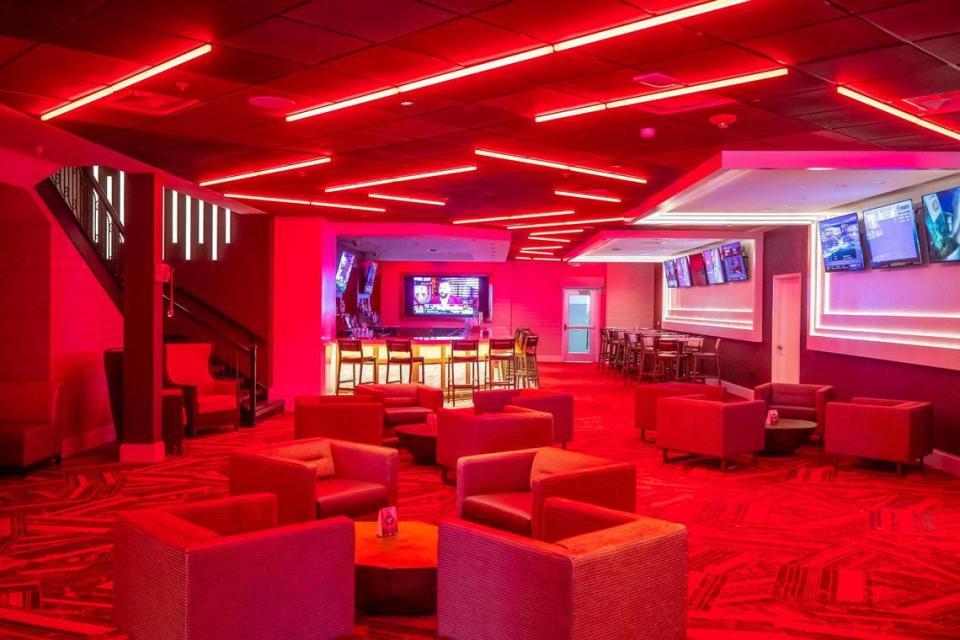
Legal sports betting expected to start in the fall
After unsuccessful attempts in the past, the Kentucky legislature finally approved House Bill 551 for legalized sports betting on the final day of the March session. Governor Andy Beshear signed the bill into law on March 31, making Kentucky the 37th state to have legal sports betting.
“I can unequivocally say yes it was a surprise,” said Damon Thayer, majority leader of the Kentucky Senate, who had pushed for legalized sports betting in the past. “It certainly came together more quickly than I expected but not as quickly as I hoped. I had hoped we could have passed it a couple of years ago.”
Six of the seven states bordering Kentucky have legalized sports betting, meaning that Kentuckians could cross the border into those states to place wagers via phone or in-person. The tax revenue went to those states.
Kentucky’s tax revenue from sports betting will help fund the state pension system, with a slice going toward treatment for gambling addiction. By law, the state’s tracks will oversee sports wagering.
The Kentucky Horse Racing Commission announced that it will hold a special meeting in July to review and approve regulations for sports betting. That would allow the commission to begin the sports betting license application process.
Applications must be made through the state’s nine licensed horse racing tracks, though the sports betting handle will not directly benefit the tracks.
“It made logistical sense,” Thayer said of having race tracks oversee sports wagering. “If you look across the country at the places that have brick-and-mortar sportsbooks, it’s casinos, professional sports facilities and racetracks. We don’t have any casinos. We don’t have any professional sports teams. Race tracks and the Kentucky Horse Racing Commission have decades of experience in protecting the integrity of wagering. Plus, (the tracks) have the built-in facilities, the parking.”
Last month, Keeneland and Red Mile announced a partnership with Caesars Sportsbook.
“We’ll launch our mobile app as soon as the state allows operators to launch, and that will be on the Red Mile’s racetrack license there,” said Dan Shapiro, chief of development for Caesars. “Keeneland and Red Mile are going to help drive sign-ups for our mobile app. With Keeneland we’ve got obviously an iconic racetrack and race meet we think we’ll drive a lot of awareness to the Caesars Sportsbook and also give some access to really great hospitality during their fall and spring meets.”
While the vast majority of sports wagering is done on mobile device applications, there will be a brick-and-mortar site at Red Mile for in-person wagering.
“Right now, we’re going to have an in-person sportsbook at Red Mile,” Shapiro said. “We expect it to be done and open for the launch in Kentucky, which we are hoping is around the start of the football season.”
“It just so happened we were renovating the old clubhouse at the time sports gambling passed,” Keeneland’s Goodman said. “As of right now, subject to change, sports gaming will be (at the bottom floor of the clubhouse). It’s been remodeled so access will be from the gaming floor or from the clubhouse on an elevator. The old clubhouse has been remodeled, as well. It’s a beautiful facility.”
While at least 90% of the betting is done on mobile apps, sports gambling in other states has shown that bettors tend to gravitate to in-person venues for big events.
“There will be a place for brick and mortar for UK basketball games and NFL football games,” Goodman said. “They can also run by here on their way to work or whatever. It’s a great location.”
Big question: Will sports betting take money away from horse racing wagering or the historical horse racing handle?
“We see it as a positive,” Shapiro said. “At Caesars we operate sportsbooks at many of our casinos across the country. We see the synergy and the crossover. Is the core demographic a little bit different, sure. That’s part of what makes sports betting a nice amenity to add to these facilities.”
“I don’t think it’s going to pull money from our handle,” Goodman said. “I do think it will expose horse racing to a different generation.”
Churchill Downs already operates casinos and racetracks outside Kentucky where sports gambling is legal.
“We find that it does drive traffic to our properties,” CDI chairman Bill Carstanjen said on a conference call in April. “It does help the overall energy and flow of people. It’s a really good thing.”
“I don’t see it as a competition at all,” Thayer said. “These sports betting fans like action. I think the horse racing tracks have an opportunity to convert a percentage into new horse racing fans.”
In fact, Keeneland said it sees sports betting as an opportunity. Gaming and horse racing bettors tend to skew older than sports bettors, which attracts a younger generation comfortable with using its mobile phone for all kind of things, including wagering.
“There isn’t a lot of cross-marketing opportunity between somebody who plays horses versus a player who plays games,” Goodman said. “We think there is cross-marketing opportunity between somebody who (bets) sports and somebody who plays horses.”
Thayer said he has never made a sports bet, but he does make a prediction.
“I think this is going to exceed expectations,” he said. “I think the numbers are going to be higher than predicted by economists. I think it’s going to succeed at a higher level than ever predicted.”
